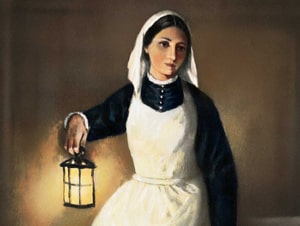Reading practice on Florence Nightingale with a documentary for young learners to improve reading and listening comprehension. Improve your vocabulary in context and listen to any word or phrase in this lesson. A passion for nursing Florence Nightingale revolutionized the job of nursing. She cared for sick and wounded British soldiers during the Crimean War (1853-1856), and she saved many lives. Her success in improving nursing care brought her great fame. Florence Nightingale was born in 1820 to a wealthy English family. She decided in her teens to become a nurse, even though her parents disapproved. At that time, most ...
Home » English for Young Learners » Reading Practice on Florence Nightingale for Young Learners

Reading Practice on Florence Nightingale for Young Learners
Updated: by Dr. Mohammad Hossein Hariri Asl
Time to Read: 3 minutes | 447 Views | 14 Comments on Reading Practice on Florence Nightingale for Young Learners
Share This Post
About the Author
Dr. Mohammad Hossein Hariri Asl is an English and Persian instructor, educator, researcher, inventor, published author, blogger, SEO expert, website developer, entrepreneur, and the creator of LELB Society. He's got a PhD in TEFL (Teaching English as a Foreign Language).
Number of Posts: 4242



And I have another question:
What does this sentence mean?
My life flashed before my eyes.
It must refer to someone’s near death experience or NDE when the subject can review their entire life in some flashbacks in a nutshell.
Please provide me with the context as well.
Sure, I saw this phrase in a meme on Instagram.
That is the source. By context, I meant a couple of sentences before and after the intended part so that I could make a more accurate guess on the requested meaning.
Yeah I know that.
It was a video meme, and the only thing that was said, was this.
But your definition to that phrase make sense to that video.
I have gotten the point.
Thank you
Glad I could help!
You’re most welcome.
Hello Dr.Hariri,
I have just finished the reading text, and I came up with some questions about the reading.
1. (Her success in improving nursing care brought her great fame.) In this sentence, don’t we need to put an (a) before ( great fame)?
2.(Nightingale devoted the rest of her long life to improving public health) and here , doesn’t it mean to be like this: (to improve public health), I thought we have to use an infinitive after to.
Hi dear Armaghan,
I would be happy to answer all of your questions here. Don’t hesitate to ask me any question you have.
* Fame is uncountable. It means you cannot count it, e.g. happiness, joy, sadness, and the like.
* This “to” is different from the one used before infinitives. Some further examples:
I don’t object to chewing gums in my class, said the teacher.
Please pay attention to driving and not texting at the steering wheel, said the police officer to the reckless driver.
I devoted, committed, dedicated my life to writing books and teaching online.
Note. In all the above examples, you need to use a gerund or -ing form of a verb after ‘to’ because the part of the sentence after ‘to’ is a noun phrase and it could be substituted for a pronoun like IT.
I devoted my life to it (writing books or teaching online.
Thank you.
I have gotten the point now.
My pleasure. Anytime.
Hello Dr.Hariri ,
I have few question:
1. what does this sentence mean? ( I can remember, wash of that over us.)
2. what is the meaning of this phrase? ( Not in the flesh.)
3. and this one: ( for no reason at all) , what does ( at all ) mean here?
Sure, anytime!
1. wash over someone means to have a strong influence on someone or affect someone noticeably and emotionally. Also depending on the context being used, it might mean that it did not influence us very much and it it didn’t have any deep effect on us.
2. Not in the flash means not in real life or not in person, and conversely, in a film, in a photo or picture, on TV or radio, etc.
3. At all is used to put emphasis on something in a negative way. For no reason at all means: certainly not, not at all.
Thanks for your response.
It’s my pleasure.